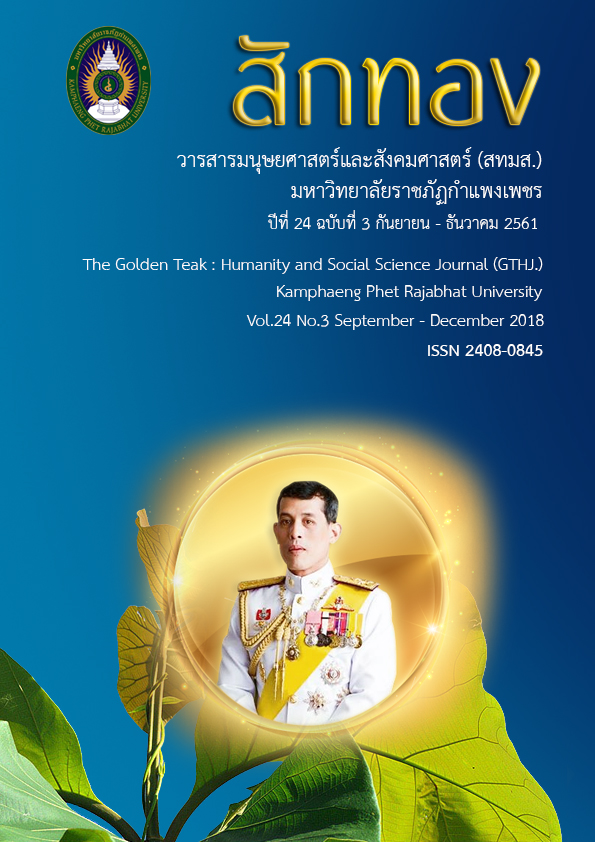A Study of Business Management Personnel's Potential in Thailand and Indochina Countries for the Chinese Trade and Investment Expansion
Main Article Content
Abstract
The purposes of this research were to develop appropriate courses and details for learning business administration to do business or invest with the Chinese businessmen in Thailand and Indochina countries. The 19 participants were businessmen and executives of the Chinese corporations in Thailand. The data were collected by using an in-depth interview, focus group, and Delphi technique. The results of Delphi technique indicated that the curriculum should include issues about the Chinese. In addition, the experts suggested 32 courses: 1) Chinese culture and business administration, 2) international human resource management, 3) human resource management for the Chinese, 4) trade and investment in China, 5) business economics with the Chinese, 6) international business strategy management, 7) marketing and Chinese market behaviors, 8) international laws and business management, 9) imports and exports with the Chinese, 10) freight businesses, 11) international finance and banking, 12) organizations and management, 13) Chinese organizational behaviors, 14) performance management, 15) organizational communication, 16) human resource innovation management, 17) principles of Chinese business management, 18) information technology for human resource management, 19) the Chinese language for business communication, 20) industrial organization theories, 21) international standards and management, 22) computer in the Chinese language, 23) leadership and teamwork, 24) marketing principles, 25) organizational management and administration for the Chinese, 26) business financial management, 27) research in business, 28) organization’s innovation and information management, 29) world and Chinese macroeconomics, 30) strategic management, 31) principles of accounting, and 32) business ethics. Seventeen out of the 32 courses were new and different from common Chinese management curriculum. Therefore, the results of this research can be used to improve personnel at an undergraduate degree in Thailand and Indochina countries to meet the expansion of Chinese investment.
Article Details
บทความที่ได้รับการตีพิมพ์เป็นลิขสิทธิ์ของวารสาร สักทอง : วารสารมนุษยศาสตร์และสังคมศาสตร์ สถาบันวิจัยและพัฒนา มหาวิทยาลับราชภัฏกำแพงเพชร
ข้อคิดเห็นใดๆ ที่ปรากฎในวารสารเป็นวรรณกรรมของผู้เขียนโดยเฉพาะ ซึ่งมหาวิทยาลัยราชภัฏกำแพงเพชรและบรรณาธิการไม่จำเป็นต้องเห็นด้วย
References
Foreign Commercial Office in Beijing. (2010). Under ASEAN-China Free Trade Agreement : Economic Relationship between Thailand and China. [Online]. Available : http://www.thaibizchina.com/thaibizchina/th/articles/detail.php?IBLOCK_ID= 70&SECTION_ID=507&ELEMENT_ID=5490 [2016, August 20].
Gotomanager 360. (2013). Phitsanulok, the outpost of the city of change. [Online].Available : https://bit.ly/2DussVG [2016, October 4].
Institute of East Asian Studies. (2010).The international journal of East Asian studies.International Journal of East Asian Studies, 15(1-2).
Kijpreedaborisut, B. (1997 ). Social Science Research Methods. (7 th ed.). Bangkok :Charoen Phon.
Kotter, J. & Heskett, J. (1992). Corporate Culture and Performance. New York : The Free Press.
Sangrawee, B. (2015) Managed by the Three Kingdoms strategy. Bangkok : Sukkhapabjai.
Yoelao, D. (2006, January-June). How do we use future research and education development for maximum benefit?. The Golden Teak : Humanity and Social Science Journal, 12(1), 1-24.
Zakkour, M. (2014). How Jack Ma's 'Crazy' Management Style Built a Technology Empire. [Online]. Available : http://www.entrepreneur.com/article/237881 [2016, January 30].


